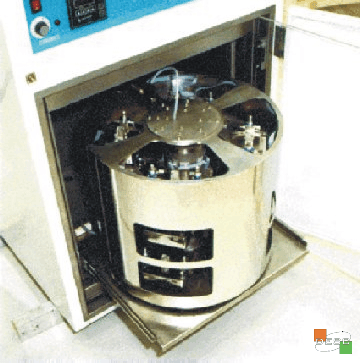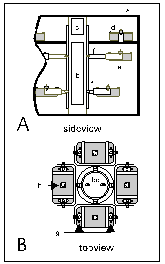
MidiCAR Cell / Tissue Culture Centrifuge
The Medium Sized Centrifuge for Acceleration Research (MidiCAR) is a dedicated centrifuge in which samples may be exposed to accelerations up to 100 times Earth's gravity.
The facility is accommodated in a temperature-controlled incubator and driven by dedicated software. Gravity levels may be chosen according specific user requirements, either static or dynamic. The system may be applied for short term (seconds) or long term (weeks) studies. Dedicated experiment vessels are compatible with standard laboratory tissue / cell culture hardware but also flight specific modules may be accommodated. Data and power lines are available on the rotating and static positions. Both rotating and static control samples are housed in the same environment.

The MidiCAR centrifuge slide out of its incubator

Schematic layout of the MidiCAR centrifuge.
A: Side view: a: incubator, b: motor, c: slip ring set, d: static control cultures, e: experiment vessels, f: two levels of rotor arms. B: Top view: bc: core structure and housing slipring and motor, g: valves for flushing culture vessels, h: water seal for reducing over-pressure in vessels.
For standard experiments it is preferred
to use standard lab disposables as experiment container. When more sophisticated
tasks need to be performed that cannot be adopted to standard lab plastics it
is possible to use more flight like experiment containers such as LIDIAs
or plunger boxes.
Future experiments on the MidiCAR could make use of developments that have taken
place within the Technology Development Program at ESA/ESTEC. Various hardware
items for gravitation biology, such as small microscopes, video cameras, cell
/ tissue / plant culture modules, insect modules etc., have been developed.
These modules might be used on the Random Positioning Machine to investigate
how biological systems will respond to simulated microgravity on the RPM or
FFM).
MidiCAR Detailed Description
|
All facilities mentioned are open
to perform your individual, dedicated, experiments or for collaborative studies.
When you are interested to perform a series of (pilot) studies using the MidiCAR
centrifuge you are invited to contact us and discuss
various possibilities. You may also directly send an experiment proposal either
to DESC or respond to one of the international Announcements of Opportunities (AO) as are in general annually issued by the European
Space Agency (ESA) or other space agencies. You may also apply via an unsolicited
proposal to ESA via the 'fast
track' ESA Ground Based Facilities Program (CORA: Continuously Open Research Announcements), or via the ' ESA OSIP Platform '. You may contact us when you need any support for this.
The MidiCAR centrifuge is developed by Dutch Space (former Fokker Space), Leiden,
The Netherlands. - - - - - For additional info please contact Jack van Loon: j.vanloon[at]amsterdamumc.nl.
Reference:
van Loon J, van den Bergh L, Schelling R, Veldhuijzen J, Huijser R. Development of a centrifuge for acceleration research in cell and developmental biology. 44th International Astronautical Congress, IAF/IAA-93-G, 1993. Link